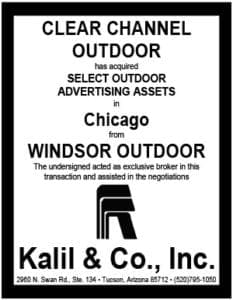 Here are 12 musts for your out of home ad contracts.
Here are 12 musts for your out of home ad contracts.
Location Info. The board number, face number, address, direction, and board size. This avoids misunderstandings. It’s easy for a client to mix up your board with boards nearby while talking on the phone.
Contract Term. Be specific about the length of the contract. Also be specific about whether you’re billing on 4 week periods or monthly periods. You should bill on 4 week periods because it will provide 13 billboard periods during the year versus 12 months.
Cost. Specify the amount per period and the total contract amount.
Billing Method and Credit Card info. Insider prefers credit card payments over invoicing because credit card clients pay faster. Corporate clients and agencies prefer invoicing. Insider finds it’s best to get the credit card info in the contract to avoid delays.
Extension and cancellation provision. Have your contracts automatically renew month to month at the end of the state term. Another approach is to require 30 days notice of termination in writing. This gives you options to keep a location occupied if a client stalls negotiations and then decides not to renew at the last minute.
Lighting Clause. Specify if the board is lit and if so what hours. Insider has seen some contracts which charge more for 24 hour lighting. There should also be a clause dealing with lighting outages. The normal convention is to provide a 10% discount in the contract if there are lighting outages.
Production Cost. Specify who pays production and installation upfront and on each vinyl change. The norm is for clients to pay vinyl. Install costs are sometimes but not always charged to the client. Insider often agrees to provide one free vinyl and one free vinyl install to clients every 12 months if they agree to a long term contract.
Payment Terms. Agencies will want 60-120 day payment terms. Insider uses 30 day terms for other clients. Many out of home companies require payment in advance, especially for startup businesses or business which are a credit risk. If a restaurant hasn’t paid you in 60 days if probably won’t pay you.
Content Clause. The contract should specify that (1) you have sole editorial approval over what goes on the sign and can refuse to run unlawful, objectionable material (2) your client has authority to use any trademark or logo which appears in the display. This will keep you out of hot water with your landlords, the local community and trademark attorneys.
Default Provision. Your contract should specify that if not paid you can remove the vinyl immediately and rent the board. Some contracts also specify that on default the entire unpaid balance is due. This may give you some leverage, but Insider thinks this is overkill. An unpaid future balance will be hard to collect without hard feelings especially in a small town.
Invoicing. The contract should specify who gets invoices and how (email or regular mail). Often there will be multiple people who need the invoice, especially when large companies are involved or there’s coop marketing money.
Contact Info. The contract should give the name, email, phone and title of the person signing. Make sure that your contract is signed by someone with authority or you may not be able to collect.
Has Insider left anything out? Let Insider know using the form below.
[wpforms id=”8663″]
Paid Advertisement

















